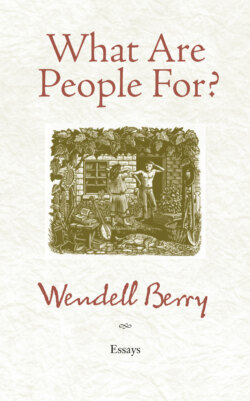Читать книгу What Are People For? - Wendell Berry - Страница 6
На сайте Литреса книга снята с продажи.
ОглавлениеDAMAGE
I
I have a steep wooded hillside that I wanted to be able to pasture occasionally, but it had no permanent water supply.
About halfway to the top of the slope there is a narrow bench, on which I thought I could make a small pond. I hired a man with a bulldozer to dig one. He cleared away the trees and then formed the pond, cutting into the hill on the upper side, piling the loosened dirt in a curving earthwork on the lower.
The pond appeared to be a success. Before the bulldozer quit work, water had already begun to seep in. Soon there was enough to support a few head of stock. To heal the exposed ground, I fertilized it and sowed it with grass and clover.
We had an extremely wet fall and winter, with the usual freezing and thawing. The ground grew heavy with water, and soft. The earthwork slumped; a large slice of the woods floor on the upper side slipped down into the pond.
The trouble was the familiar one: too much power, too little knowledge. The fault was mine.
I was careful to get expert advice. But this only exemplifies what I already knew. No expert knows everything about every place, not even everything about any place. If one’s knowledge of one’s whereabouts is insufficient, if one’s judgment is unsound, then expert advice is of little use.
II
In general, I have used my farm carefully. It could be said, I think, that I have improved it more than I have damaged it.
My aim has been to go against its history and to repair the damage of other people. But now a part of its damage is my own.
The pond was a modest piece of work, and so the damage is not extensive. In the course of time and nature it will heal.
And yet there is damage—to my place, and to me. I have carried out, before my own eyes and against my intention, a part of the modern tragedy: I have made a lasting flaw in the face of the earth, for no lasting good.
Until that wound in the hillside, my place, is healed, there will be something impaired in my mind. My peace is damaged. I will not be able to forget it.
III
It used to be that I could think of art as a refuge from such troubles. From the imperfections of life, one could take refuge in the perfections of art. One could read a good poem—or better, write one.
Art was what was truly permanent, therefore what truly mattered. The rest was “but a spume that plays / Upon a ghostly paradigm of things.”
I am no longer able to think that way. That is because I now live in my subject. My subject is my place in the world, and I live in my place.
There is a sense in which I no longer “go to work.” If I live in my place, which is my subject, then I am “at” my work even when I am not working. It is “my” work because I cannot escape it.
If I live in my subject, then writing about it cannot “free” me of it or “get it out of my system.” When I am finished writing, I can only return to what I have been writing about.
While I have been writing about it, time will have changed it. Over longer stretches of time, I will change it. Ultimately, it will be changed by what I write, inasmuch as I, who change my subject, am changed by what I write about it.
If I have damaged my subject, then I have damaged my art. What aspired to be whole has met damage face to face, and has come away wounded. And so it loses interest both in the anesthetic and in the purely esthetic.
It accepts the clarification of pain, and concerns itself with healing. It cultivates the scar that is the course of time and nature over damage: the landmark and mindmark that is the notation of a limit.
To lose the scar of knowledge is to renew the wound.
An art that heals and protects its subject is a geography of scars.
IV
“You never know what is enough unless you know what is more than enough.”
I used to think of Blake’s sentence as a justification of youthful excess. By now I know that it describes the peculiar condemnation of our species. When the road of excess has reached the palace of wisdom it is a healed wound, a long scar.
Culture preserves the map and the records of past journeys so that no generation will permanently destroy the route.
The more local and settled the culture, the better it stays put, the less the damage. It is the foreigner whose road of excess leads to a desert.
Blake gives the just proportion or control in another proverb: “No bird soars too high, if he soars with his own wings.” Only when our acts are empowered with more than bodily strength do we need to think of limits.
It was no thought or word that called culture into being, but a tool or a weapon. After the stone axe we needed song and story to remember innocence, to record effect—and so to describe the limits, to say what can be done without damage.
The use only of our bodies for work or love or pleasure, or even for combat, sets us free again in the wilderness, and we exult.
But a man with a machine and inadequate culture—such as
I was when I made my pond—is a pestilence. He shakes more than he can hold.
1975
